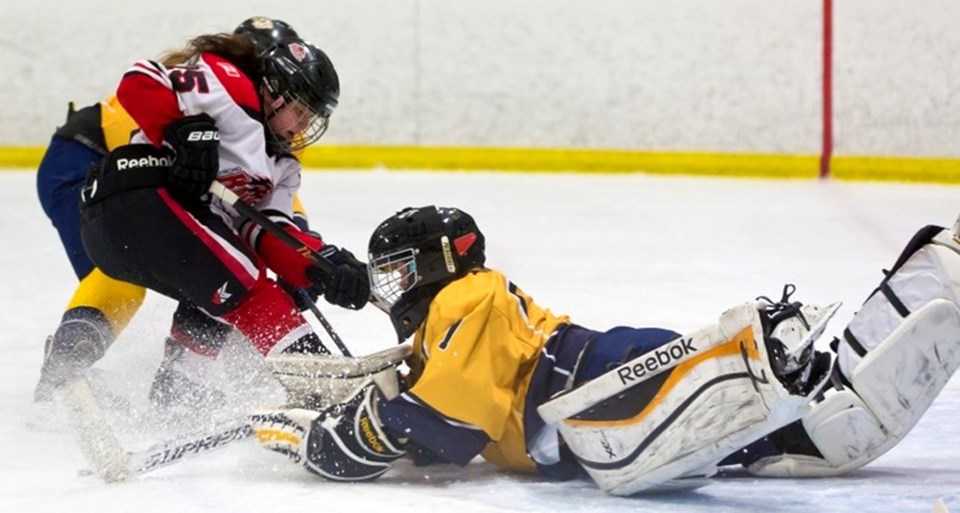A Port Moody family says their daughter is reconsidering her participation in minor hockey after a cyberbullying incident with a teammate.
But their concern is not so much about the specific incident; rather they feel the system to resolve complaints lacks transparency and is stacked to protect the sport rather than its participants.
Claudia and Adam Fiorentino said their daughter’s fourth season in the Tri-Cities Female Ice Hockey Association was marred by some comments made on a team chat group following a tournament in Victoria. But when they brought the incident to the attention of the association, “they seemed to spend a lot of time trying to find the reason rather than focussing on the consequences,” said Claudia Fiorentino adding the family was advised to pick their battles.
‘Shrug it off’
Adam Fiorentino said they ran into more of the same when they escalated their complaint to the Pacific Amateur Hockey Association and BC Hockey.
“These governing bodies shrug it off,” he said. “At the end of the day, they do nothing for us.’
In an email to the Tri-City News, the president of the TCFIHA, Heather Fox, said the incident had been investigated by three separate entities, including the association’s own discipline committee, BC Hockey’s ombudsman and Hockey Canada’s independent third party investigator.
“Each of these investigations independently determined that no maltreatment had occurred,” Fox said, adding she could provide no further comment.
What the bylaws state
TCFIHA bylaws state its players, coaches, officials and even parents are expected to abide by a code of conduct that “sets a minimum standard we expect all members to uphold.”
As well, the association defines harassment as a “behaviour by one person towards another which is insulting, intimidating, humiliating, malicious, degrading or offensive” that “creates negative uncomfortable feelings for the person, or group of persons, to whom it is directed.”
TCFIHA’s bylaws also state it has zero tolerance for cyberbullying, as well as sexual, emotional and physical abuse or harassment.
Complaints that can’t be resolved by the team manager are referred to a three-member disciplinary committee comprised of the association’s risk manager, vice-president and one board member appointed by the president, or three members of the association “who are felt to be unbiased and impartial.”
The Fiorentino’s said it’s that self-governing nature of minor sports that makes it difficult to achieve transparency when it comes to resolving disputes.
“We felt like we were making more work for them,” Adam Fiorentino said. “They make you feel like you’re on trial.”
More complaints
James Rae, the president of the Pacific Amateur Hockey Association that governs minor hockey in the Lower Mainland, didn’t respond to a request for comment from the Tri-City News, but in an email to the Fiorentino’s, he said there’s been an “uptick in conduct related concerns, maltreatment complaints, discipline and the like.”
He said outside factors like the pandemic and the current economic uncertainties “have shortened fuses and made it more difficult for volunteers and parents to maintain a positive, collegial environment,” then encouraged the family to seek legal counsel if they couldn’t get satisfaction from the local association.
BC Hockey told the Fiorentino’s it forwarded their complaint to an independent ombudsperson who found it “did not fall within the ground in BC Hockey’s harassment policy” and Hockey Canada’s Independent Third Party assessors said it didn’t have jurisdiction to adjudicate the complaint because it “does not allege misconduct on behalf of a member participant nor an organizational participant.”
Claudia Fiorentino said the vague nature of the responses felt more like buck passing.
“There is so much rah, rah around making it fun and inclusive, but then when something happens that threatens that idea, there’s nothing being done about it,” she said.
Working to make sport more compassionate
Sarah-Eve Pelletier, the head of Canada’s Office of the Sport Integrity Commissioner which was created in 2022 to ensure sport at all levels in the country is conducted in a “compassionate, efficient and fair manner,” said it’s important for sports organizations to have good governance that includes a set of rules to set expectations when things go awry.
“Everyone benefits from having a process for looking through these matters with transparency,” she said, adding there is growing conversation that the complaints process should involve independent outside mechanisms.
But, Pelletier said, that can be challenging to achieve for small, grass-root associations that run largely on the passion of dedicated volunteers.
The answer, she said, might be for a number of organizations to work together to come up with a process they all can access.
Pelletier said her group is working to facilitate such efforts by providing resources education programs.
“We have to be there to accompany them as part of the process,” she said. “This is important to have a robust system to build a trust. If people are fearful of consequences if they speak out, that just makes it worse.”
Weighing options
The Fiorentino’s said while their daughter has largely put the trauma of the cyberbullying incident behind her, she’s weighing her options for next season. She might sign up for boys hockey because there’s less “drama.”
“She loves the sport,” Claudia Fiorentino said. “It’s just about having fun, getting exercise and camaraderie.”
Adam Fiorentino said if their daughter does decide to return to hockey, they’ll go into it with open eyes and hopeful that by going public with their experience a spark to change may ignite.
“It’s about going forward and making sure these things are handled in a proper manner.”
SOUND OFF: Have you had a negative experience with a minor sports association? Do you think minor sports organizations are transparent enough about their complaint procedures? Send us a Letter to the Editor. Be sure to include your full name and your city of residence.



